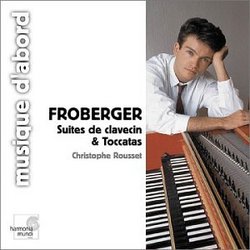| All Artists: Johann Jacob Froberger Title: Froberger: Suites de clavecin & Toccatas Members Wishing: 0 Total Copies: 0 Label: Harmonia Mundi Fr. Original Release Date: 1/1/2000 Re-Release Date: 6/11/2002 Album Type: Import Genre: Classical Styles: Chamber Music, Forms & Genres, Suites, Historical Periods, Baroque (c.1600-1750), Classical (c.1770-1830) Number of Discs: 1 SwapaCD Credits: 1 UPC: 794881671823 |
Search - Johann Jacob Froberger :: Froberger: Suites de clavecin & Toccatas
CD Details |
CD ReviewsPassion - yes; atmospherics and inner resonance ? never Phil Rogers | Ann Arbor, Michigan | 04/09/2004 (3 out of 5 stars) "Here, Rousset rolls his chords and ornaments like they're dice, assuming he'll get lucky with his listeners. But a gaming table at Monte Carlo and the harpsichord are quite different beasts - each must dealt with in dramatically different fashions. Here, for Rousset everything is undaunted dash - there's no reflection, no quiet breathing/phrasing - little recognizable emotion unless maybe what - grandiosity? Most afficionados surely would consider this a highly uncharacteristic, over-simplified reading of Froberger's music. Yes, it appears that early music's "enfant terrible" is having one of his more "interesting" moments. This is very odd, considering how utterly beautiful and profound were many of his efforts recording Francois Couperin's complete works for harpsichord. There (though, like so many of us, he often gave relatively humdrum performances on Couperin's harder-to-fathom, superficially more colorless pieces) he was often as sublime sounding as possibly anyone who has ever played the instrument; and was never close to coming off as obnoxious. Certainly Rousset's interpretations cannot be faulted for not being passionate; but all the tunes here have the same stirring, emotional quality - the palette he is using is extremely limited - and everything is played, relatively speaking, at near breakneck speed. This is silly for the sarabands. It's ludicrous for the first track, which is titled "Plainte Faite a Londres pour Passer la Melancholie". Mr. Rousset has a right to assume his playing of this piece is for the purpose of sweeping the melancholic mood away with grand (muscular?) gestures; we have a right, and a duty to disagree.Another strike against this CD - the harpsichord sounds as if it was mike?d right above its soundboard ? it is very harsh, and the stereo field is unnatural sounding, i.e. extremely wide. This is analogous to listening with your head/ears right above the soundboard, it would probably cause you physical pain ? it certainly would not sound good, sweet, etc.When recording a harpsichord, it?s often best to walk around while the musician is playing to get a sense where things sound the best; after all the stereo microphones are playing the role of artificial ears. Better yet, let the harpsichordist him/herself listen while another keyboardist is playing ? then of course you'd want to crosscheck your determination with the (hopefully) experienced engineer. A couple of effective strategies are to place the microphones either above the head of the performer (to get it from his/her perspective), or else somewhat farther away (an audience perspective) ? if and when you want the ambience of the room to come into play. In this second scenario, it?s important to find a good spot (there could be several) so that the natural reverberations from the room aren?t overly prominent leading to a muddy sound (where, for instance, you cannot hear all the notes clearly). Check out the always sweet-sounding CDs of harpsichordist Mitzi Meyerson for incredibly well-recorded examples presumably using this second method. She is also one of the greatest players on the planet.Note that one fix for this Rousset CD would be to place your audiophile speakers relatively close together and turn the volume down so that it?s as if you are sitting in the room where the instrument is being played. The speakers then would approximate the harpsichord's actual position in the room, and the overload/distortion on your ears would possibly be compensated for. I didn?t try this, but it might work in a medium to large-sized room. [Or for a less desirable result - run your tracks through a reverb box to artificially achieve the same thing.] The point is though, that it?s the engineer?s job to make this home-stereo ready; or else sell the darn thing for a whole lot less!For a much better rendition of Froberger also on a full-length CD, try Mr. Klosiewicz from Poland (hard to find in the U.S., though). And Gustave Leonhardt does a great job on his Froberger recordings (and his similarly-styled Louis Couperin tracks, as might be expected)."
|

